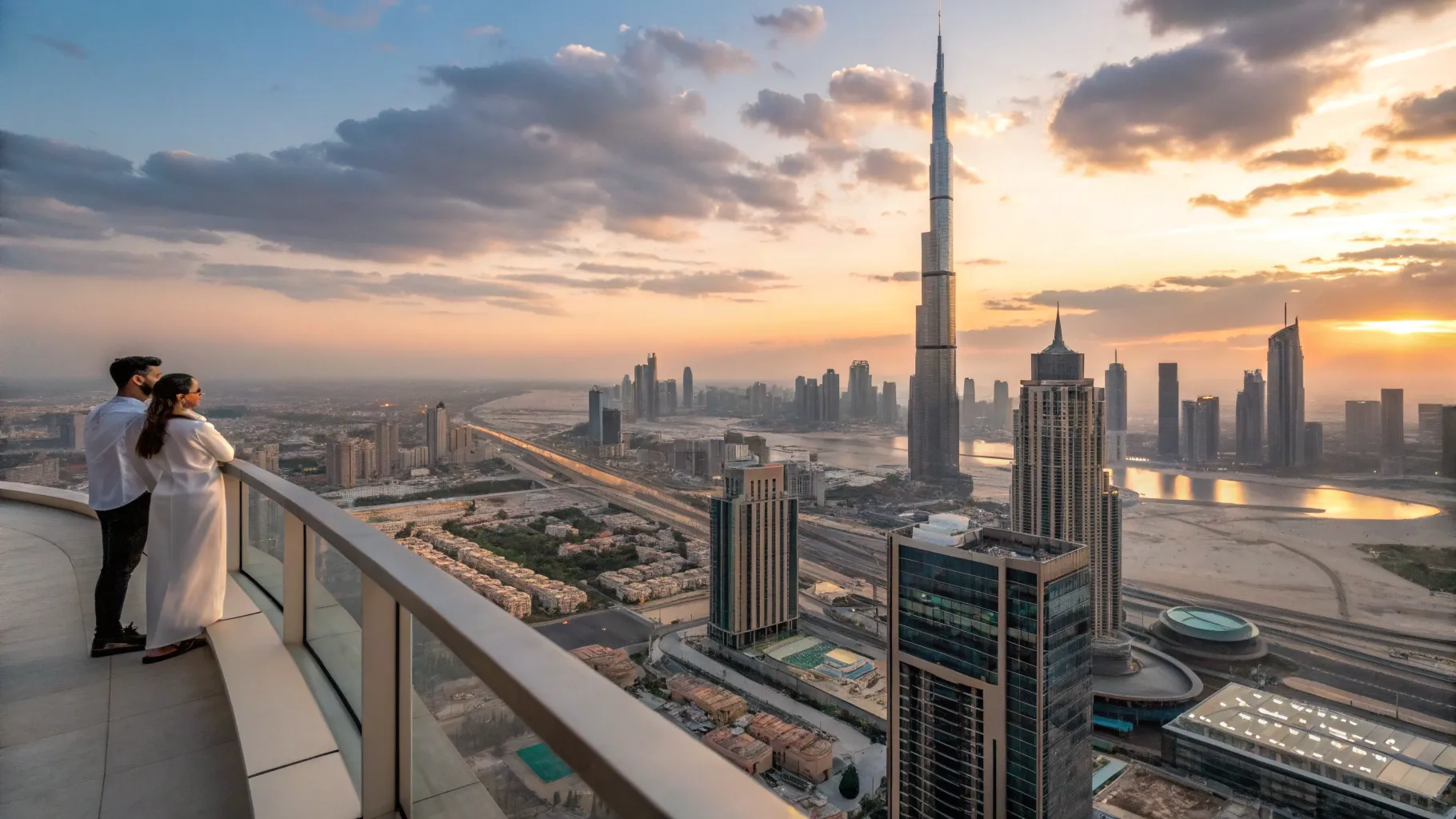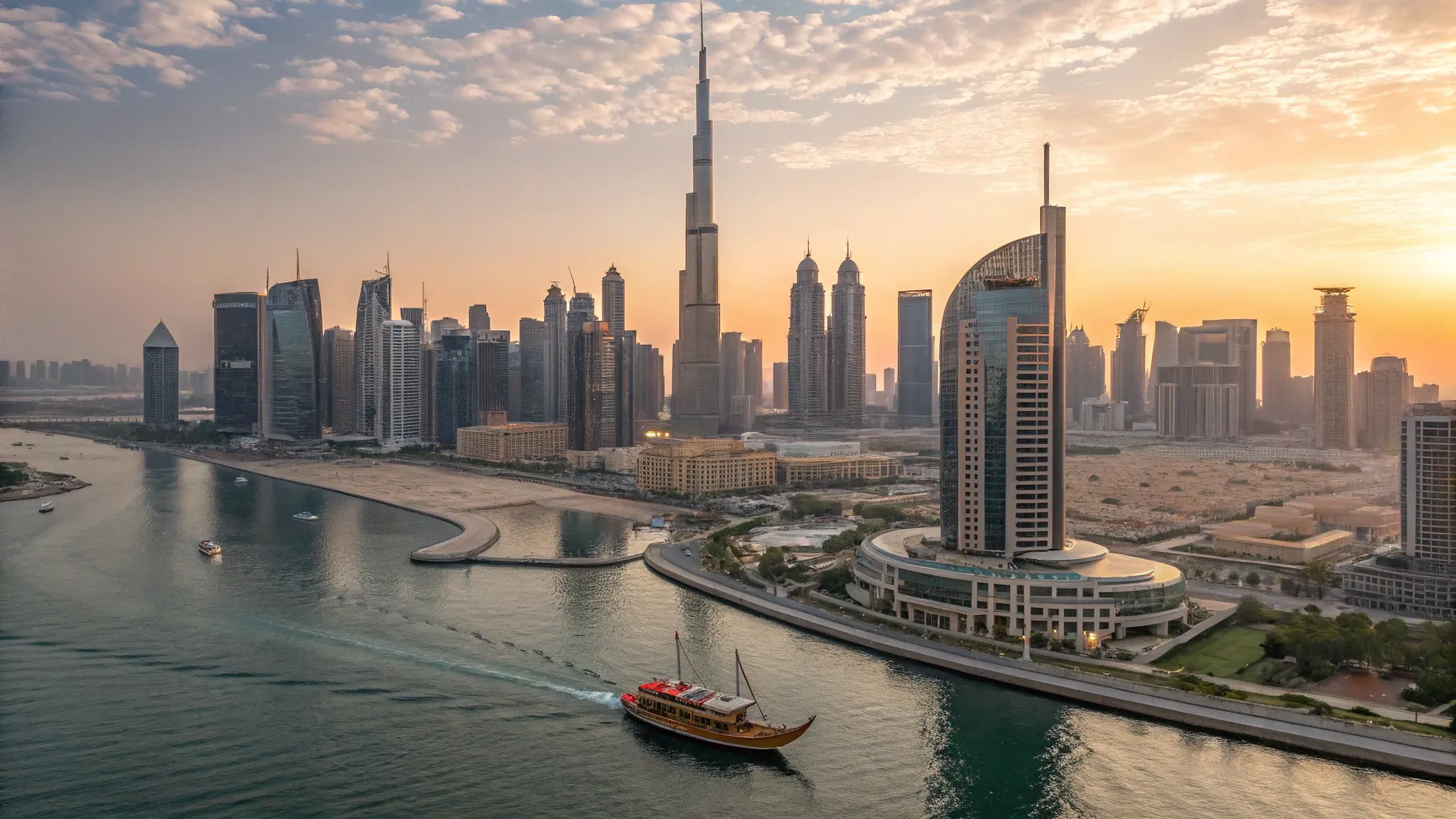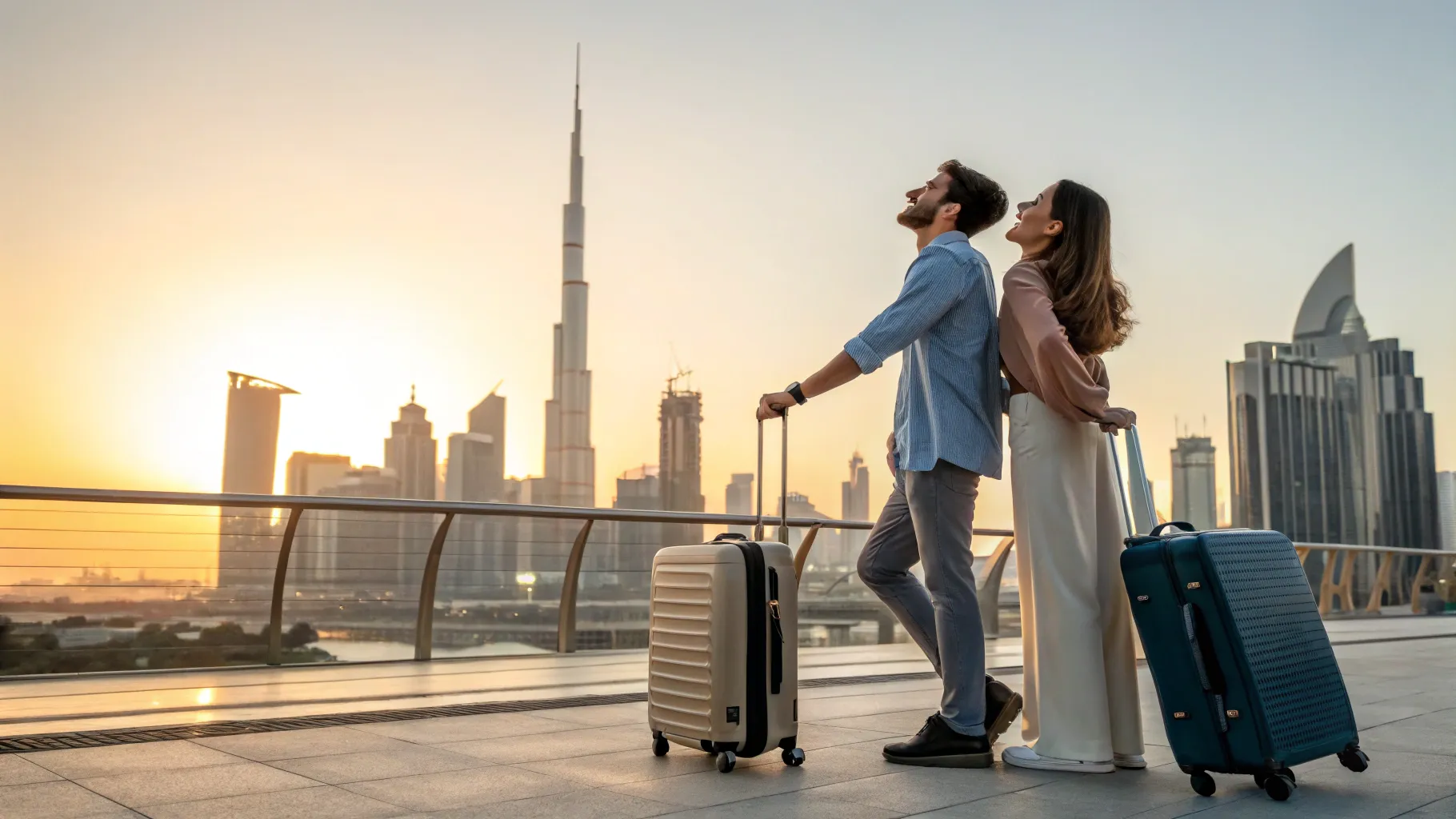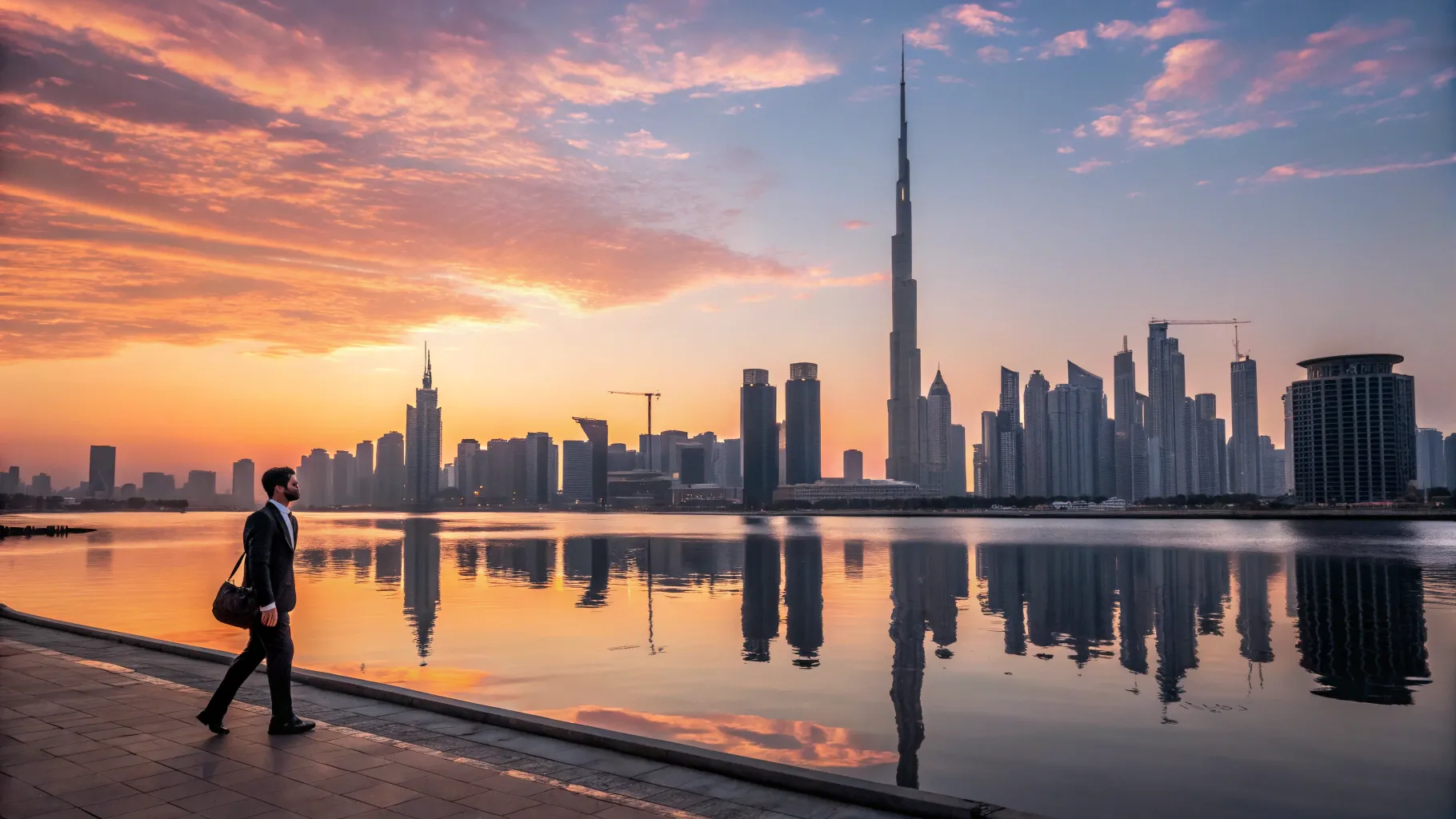- Blog
- moving to dubai from canada guide
Moving to Dubai from Canada: The Complete 2026 Guide

Relocating to Dubai from Canada? Discover the 2026 requirements for visas, tax-free salaries, schooling costs, and business setup in this comprehensive guide.
Founder of JustMove
Summarize content with
Get AI-powered insights and summaries of this article
Just Move is the preferred partner of entrepreneurs
Expert in incorporation, accounting and immigration
Trusted by over 500+ entrepreneurs
4.9/5 reviews from our clients
100% satisfaction across all services
Leaving behind the biting Canadian winters and high tax brackets for a life of year-round sunshine and financial freedom is a move many are considering in 2026. While Canada offers a stable environment, the business-friendly climate of the Middle East provides a strong alternative for those seeking growth. This updated moving to dubai from canada guide is specifically designed for Canadian entrepreneurs, freelancers, and investors who want to trade the maple leaf for the desert sun.
We understand that maintaining your sanity during an international relocation requires clear, actionable information. This guide provides a comprehensive overview for Canadians moving from Canada to Dubai, solving the problem of navigating complex administrative hurdles. The United Arab Emirates (UAE) is comprised of seven Emirates and is a modern hub attracting expatriates with its culture, business, and luxury. While each Emirate has its charm, Dubai remains the primary destination for canadian expats seeking global connectivity.
Within this resource, we cover essential topics including visa requirements, cost of living, employment opportunities, cultural differences, healthcare, and education options in Dubai for Canadians. Whether you are launching a startup or relocating an established SME, we simplify the journey from your initial entry to long-term residency. Understanding these foundational elements is the first step toward a successful move to the uae.
Preparation begins with understanding the legal pathways that allow you to call this vibrant city your new home.
Why Canadians are Choosing Dubai in 2026
For many professionals and business owners, the decision to relocate is driven by a desire for financial freedom and a strong professional ecosystem. This updated moving to dubai from canada guide highlights why 2026 is the year many are finally making the leap to the Middle East.
Financial Advantages for a Canadian Moving to Dubai
The primary draw for most residents remains the UAE’s tax-free income environment. While Canada utilizes a progressive tax system where high earners can see nearly half their income consumed by federal and provincial taxes, Dubai offers 0% personal income tax.
This results in significantly higher net salaries for Canadians compared to major cities like Toronto or Vancouver. For entrepreneurs, these tax-free salaries represent a significant financial advantage, providing more liquid capital to reinvest into business growth or personal wealth.
By choosing to move to the uae, professionals can capitalize on the currency strength of the Dirham, which is pegged to the US Dollar. This stability provides a level of financial sanity that is increasingly difficult to find in the current North American economic climate.
Quality of Life and Global Lifestyle
Beyond the purely financial incentives, canadian expats are drawn to the unparalleled safety, cleanliness, and infrastructure found in the Emirates. The city provides a truly global lifestyle that appeals to those looking for a diverse and modern environment for their families and businesses.
When moving from canada to dubai, most individuals cite specific reasons for their choice:
- Professional opportunities: A rapidly expanding market for SMEs and tech startups.
- Safety and Cleanliness: Consistently ranked among the safest cities in the world.
- Weather: Year-round sunshine and a vibrant outdoor lifestyle.
- Ease of Setup: Digital processes that make moving to the uae more efficient than ever.
Canadians moving to dubai often find that the combination of professional growth and a high standard of living creates a compelling case for relocation. Transitioning to this new market is a strategic step that requires careful planning regarding your legal and professional status.
Visa and Residency Requirements for Canadians
Canadian citizens receive a 90-day visa-on-arrival for tourism in Dubai without prior application. This entry permit is ideal for exploring neighborhoods or attending initial business consultations. However, for a permanent move to the UAE, a formal residency permit is required to access essential services like banking and long-term leasing.
Residency Pathways for Any Canadian Moving to Dubai
To work and live legally in the region, you must obtain a residence visa and a work permit. While these are typically handled by an employer for traditional roles, entrepreneurs have several independent pathways. This moving to dubai from canada guide highlights that the UAE’s digital infrastructure addresses the need for speed, with visa processing often taking approximately five days.
Standard Work Visa: A 2-year residence visa and work permit for employees, which is traditionally employer-sponsored. Green Visa: A 5-year residence visa for skilled employees or investors that requires no sponsor and offers more flexibility. Golden Visa: A 5 or 10-year residency for entrepreneurs, investors, and talents who meet specific investment thresholds. Learn more in our Golden Visa UAE guide. Retiree Visa: A 5-year residence visa for individuals over 55 who meet the financial criteria as written in current immigration laws.
Digital Processing and Timeline
The efficiency of the UAE's systems allows Just Move to manage the majority of your company formation and visa applications through a 100% online process. While a Canadian moving to dubai can initiate these steps from abroad, a physical visit is required for the medical fitness test and biometrics. This final stage usually takes only one week to complete before your Emirates ID is issued.
Establishing residency also carries significant tax implications that require careful planning. According to the 183-day rule, spending more than half the year in the country is the gold standard for proving tax residency to foreign authorities. This ensures that canadian expats can fully benefit from the UAE's competitive tax environment while maintaining global compliance.
Securing your legal status is the essential foundation for building a new life in the Arabian Gulf. Once the residency paperwork is initiated, the focus shifts to the specific financial frameworks that will govern your business and personal income.
Cost of Living: Dubai vs. Canadian Cities
Understanding the financial shift is a critical component of any moving to dubai from canada guide. While the UAE offers tax-free salaries, your lifestyle choices significantly dictate your monthly expenses compared to living in major Canadian hubs like Toronto or Vancouver. For a detailed breakdown, explore our cost of living Dubai guide. This transition requires a strong grasp of local market dynamics, and you can quickly estimate your Dubai business setup cost to plan your finances effectively.
Different data sources provide varying perspectives on the financial transition. According to Numbeo.com, consumer prices including rent in Dubai are 6.7% lower than in Toronto. Conversely, other market analyses suggest that the cost of living in Dubai is approximately 10% higher than in Toronto on average for consumer goods and services, including rent. This variance often addresses the discrepancy between standard living and the luxury services available.
Budgeting Strategy for Your Move to the UAE
When canadians moving to dubai calculate their overhead, they must account for varying price points in utilities and leisure. A refreshed look at current market rates provides a clearer picture for canadian expats planning their relocation.
Daily Expenses: The average estimated monthly cost of living for a single person without rent in Dubai is 3,994.9 AED. Housing Markets: While rental prices fluctuate, demand in premium neighborhoods remains high, often requiring unique payment structures compared to the monthly Canadian model. Consumer Goods: While some local services are more affordable, imported products can increase your grocery bill, requiring a careful balance of spending habits.
Successfully moving to the uae involves weighing these costs against the massive advantage of zero personal income tax. Once your personal budget is set, the next step is navigating the administrative requirements for your business and residency status.
Essential Services: Schooling, Healthcare, and Banking
Settling into a new life requires a strong understanding of the infrastructure that supports your family and business. While the cost of living in Dubai can be comparable to major Canadian cities, specific expenses like dining and international schooling can be more expensive. Planning for these costs is a core part of any moving to dubai from canada guide.
Relocation Planning: Moving to Dubai from Canada Guide for Families
Education in the UAE is known for its high standards, though it represents a significant portion of an expat budget. For those moving from canada to dubai with children, there are several key requirements to keep in mind:
- Schooling costs: Annual international school fees in Dubai range from AED 35,000 to AED 70,000 (approximately CAD 13,000 to CAD 25,500).
- Health insurance: DHA-compliant health insurance in Dubai must include an annual limit of at least AED 150,000 (CAD $57,025).
- Coverage details: Your policy must cover emergency services, inpatient and outpatient care, maternity, and prescribed medications.
Banking and Financial Addresses for Canadian Expats
Setting up your financial life addresses the immediate need for liquidity and local payments. For comprehensive guidance on how to open a bank account in Dubai, many Canadians find traditional bank transfers are costly for moving their initial capital when move to the uae.
- Currency transfers: Wise allows users to transfer funds to a UAE account at the mid-market rate with transfer fees starting at 0.48%. Use this service specifically for CAD to AED conversion to maximize your savings.
- Account setup: Just Move assists in managing the paperwork required for business and personal banking to ensure your moving to the uae is compliant with 2026 regulations.
Once your personal logistics are secured, the transition shifts toward the formal structures that define your professional presence in the Emirates.
Lifestyle and Professional Integration
Dubai stands out globally for its quality of life, world-class infrastructure, low crime rates, and a vibrant expatriate community. For those following this moving to dubai from canada guide, the transition involves moving from canada to dubai while maintaining a focus on urban convenience. The city is designed to provide residents with total sanity and safety across its diverse neighborhoods.
The professional landscape for canadian expats is defined by rapid growth and digital accessibility. Many canadians moving to dubai find that the move to the uae is facilitated by world-class government portals. If you are a canadian moving to dubai to launch a startup, the process is streamlined to ensure a healthy work-life balance. Our experts can help you launch your business in Dubai with an all-inclusive service.
A Streamlined Move to the UAE Business Market
Integrating into the local economy works by leveraging digital-first solutions.
Digital Efficiency: Use Just Move specifically for company formation to handle everything online without messy paperwork.
Rapid Licensing: Obtain your trading license in 1–5 business days to minimize downtime during your relocation.
Compliance Support: Ensure you are moving to the uae with a strong foundation by utilizing expert guidance on corporate tax and VAT.
Success in the Emirates depends on how well you align your business structure with your long-term residency goals.
Frequently Asked Questions
Can I drive in Dubai with a Canadian license?
Canadians can exchange their valid driver's license for a UAE equivalent without taking a new road test once residency is granted. This streamlined process simplifies moving to uae, allowing you to navigate various neighborhoods immediately. It is a vital step for any canadian moving to dubai who plans to commute or explore the Emirates.
How long does it take to get a residency visa?
The residency visa process takes exactly one week when managed through Just Move’s specialized 2026 fast-track service. Our moving to dubai from canada guide highlights that you only need a single seven-day visit for your medical exam and biometrics. This level of efficiency offers total sanity for canadians moving to dubai who are balancing relocation logistics.
Is healthcare free in Dubai for expats?
Healthcare in Dubai requires private medical insurance as the city does not offer a free public system for canadian expats. While the quality of care is world-class, coverage is mandatory for all residents and must be maintained to keep your license active. Ensuring you have a strong insurance plan is a critical part of moving to the uae for long-term security.
How do I manage dual citizenship while moving from Canada to Dubai?
Dual citizenship remains permitted for those moving from canada to dubai, provided you continue to meet your home-country tax and legal obligations. Consulting with a specialist can ensure you maintain a healthy status while moving to dubai. This guide recommends verifying your residency ties to avoid unexpected liabilities while you move to the uae.
The administrative landscape of the Emirates is designed to support rapid integration for professionals arriving from North America. These legal foundations ensure you can focus entirely on the operational growth of your enterprise.
Starting Your Dubai Journey
Relocating to the Emirates involves several critical milestones, from selecting the right business structure to securing residency through a digital process. A canadian moving to dubai will benefit from 0% personal income tax and, for those who move to the uae as business owners, potential tax relief throughout 2026.
The quality of life across diverse neighborhoods is world-class, offering professional sanity and safety for canadians moving to dubai. As this moving to dubai from canada guide highlights, success depends on aligning your setup with local regulations. Ensuring your records are updated with the 2026 e-invoicing standards and residency requirements is essential for long-term stability.
To ensure your moving from canada to dubai is seamless, consider partnering with Just Move. Our experts manage everything from company formation to banking, helping canadian expats build a strong foundation. If you are ready for moving to uae, contact us to simplify your moving to the uae journey today.
Founder of JustMove
Kasia is a renowned expert in business setup and relocation services in Dubai. With a proven track record as a top-performing account executive at PayPal and co-founder of luxury concierge service Alotea, she brings a wealth of experience to her role at JustMOVE. Kasia's deep understanding of the UAE market, extensive international connections, and multilingual capabilities (English, Polish, Russian, and French) make her an authority in navigating the complexities of business setup and relocation. Through the JustMOVE blog, Kasia shares her insights and practical advice to help entrepreneurs and families establish and grow their presence in the UAE. Her commitment to delivering personalized, transparent, and efficient solutions has earned her the trust of countless clients.
Check out more related articles

By Kasia

By Kasia
![Moving to Dubai from the US: Your Complete Guide [2025]](https://media.justmovedubai.com/Moving to Dubai from the US Your Complete Guide [2025].webp)
By Kasia

By Kasia

By Kasia

By Kasia